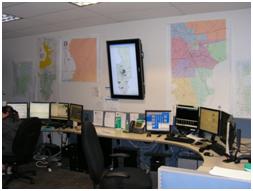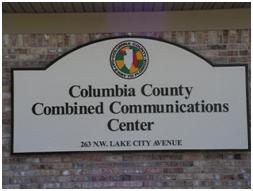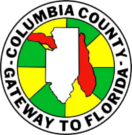 Columbia County, FL uses javascript to enhance its website and provide the public with useful features.
Columbia County, FL uses javascript to enhance its website and provide the public with useful features.Because of this, many features will not work. Please enable javascript in your browser to get the best possible experience while on our site.
About the Emergency Operations Center (911 Dispatch)
 The Columbia County, Combined Emergency Communications Center is the primary Public Safety Answering point (PSAP) for all of Columbia County, Florida. A secondary or back-up PSAP is located off site. The Center provides centralized dispatch services for Columbia County and Lake City Fire Departments, EMS resources and law enforcement dispatch for the Columbia County Sheriff's Office as a part of the Columbia County First Response System. The Emergency Communications Center is located in the Combined Communications Center complex located at 263 NW Lake City Avenue in Lake City, Florida.
The Columbia County, Combined Emergency Communications Center is the primary Public Safety Answering point (PSAP) for all of Columbia County, Florida. A secondary or back-up PSAP is located off site. The Center provides centralized dispatch services for Columbia County and Lake City Fire Departments, EMS resources and law enforcement dispatch for the Columbia County Sheriff's Office as a part of the Columbia County First Response System. The Emergency Communications Center is located in the Combined Communications Center complex located at 263 NW Lake City Avenue in Lake City, Florida.
The Center operates a computer aided dispatch system that identifies and recommends for dispatch the nearest appropriate unit to an emergency. In addition the system provides GPS (Global positioning System) tracking for emergency vehicles allowing Operators to actually see the location and dispatch the closest appropriate emergency equipment to a scene.
All Operators working in the Emergency Communications Center are certified through the Florida Department of Health as 9-1-1 Public Safety Telecommunicators.
In case of an emergency, citizens and visitors should dial 9-1-1 to access the nearest PSAP to their location where a 9-1-1 telecommunicator will make the following statement:

"911 what is the address of your emergency?"
- You will be prompted for the following information:
-
- Describe the emergency situation.
- Locations of the emergency (Street address and nearest cross street).
- The telephone number you are calling from.
- Additional questions may be asked depending on the type of emergency.
- Describe the emergency situation.
When to Call 9-1-1
In an emergency, call 911 immediately from any wired or wireless phone. An emergency is any situation that requires immediate assistance from the police, fire department or ambulance. Examples include:
- A fire
- A crime, especially if in progress
- A car crash, especially if someone is injured
- A medical emergency, such as someone who is unconscious, gasping for air or not breathing, experiencing an allergic reaction, having chest pain, having uncontrollable bleeding, or any other symptoms that require immediate medical attention
Important: If you're not sure whether the situation is a true emergency, officials recommend calling 911 and letting the call-taker determine whether you need emergency help.
When you call 911, be prepared to answer the call-taker's questions, which may include:- The location of the emergency, including the street address
- The phone number you are calling from
- The nature of the emergency
Details about the emergency, such as a physical description of a person who may have committed a crime, a description of any fire that may be burning, or a description of injuries or symptoms being experienced by a person having a medical emergency
Remember, the call-taker's questions are important to get the right kind of help to you quickly.
Be prepared to follow any instructions the call-taker gives you. Many 911 centers can tell you exactly what to do to help in an emergency until help arrives, such as providing step-by-step instructions to aid someone who is choking or needs first aid or CPR.
Finally, do not hang up until the call-taker instructs you to.
If you dial 911 by mistake, or if a child in your home dials 911 when no emergency exists, do not hang up-that could make 911 officials think that an emergency exists, and possibly send responders to your location. Instead, simply explain to the call-taker what happened.
